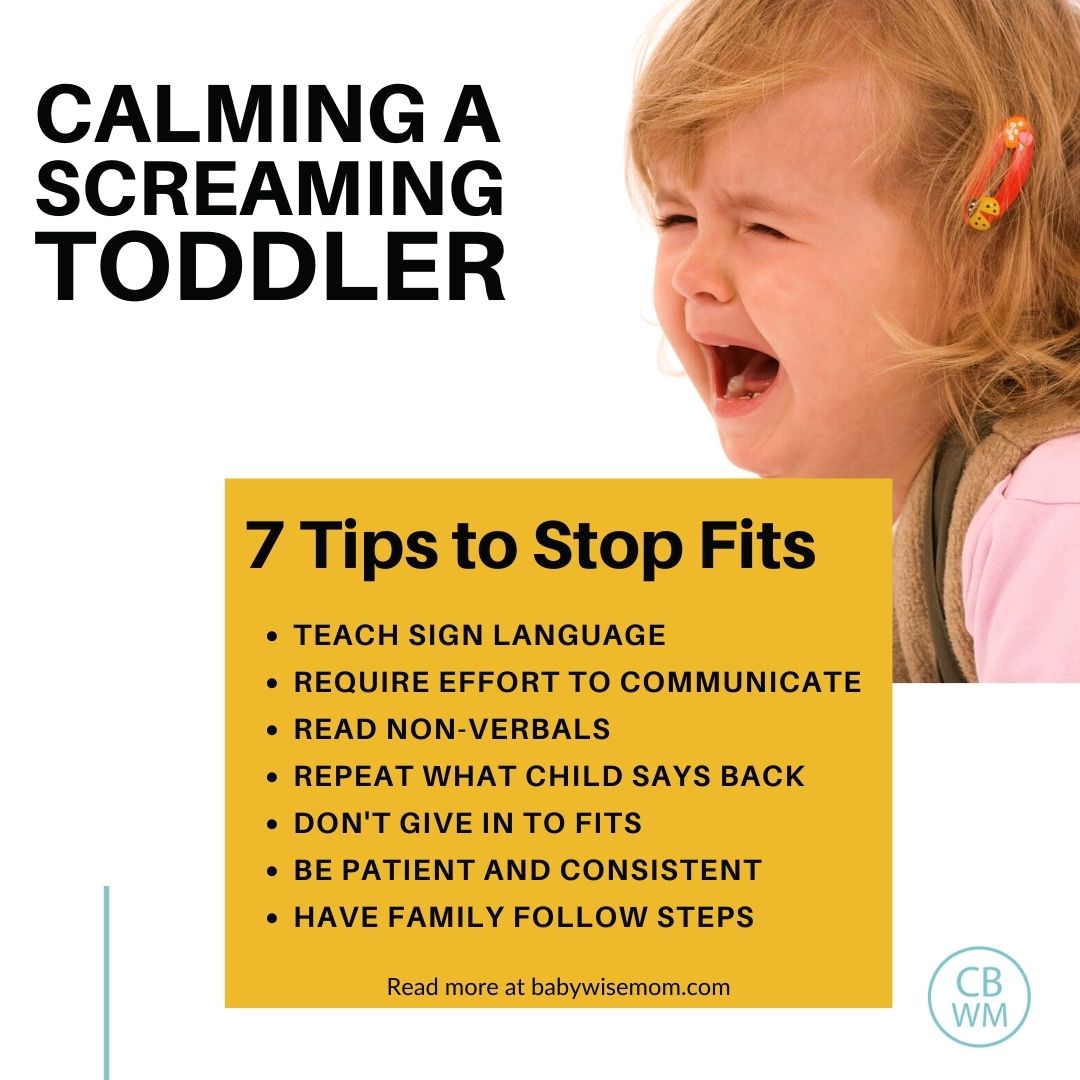Why Does My Toddler Scream So Much? Expert Solutions
Does your toddler’s constant screaming leave you feeling exhausted and overwhelmed? You’re not alone.
Many parents find themselves asking, “Why does my toddler scream so much? ” It’s a question that not only echoes through your home but also through the minds of countless parents navigating the challenges of early childhood. Understanding the reasons behind your little one’s piercing cries is the first step toward restoring peace and sanity to your daily routine.
We’ll delve into the surprising triggers of toddler screaming, offering you insights and practical solutions to transform chaos into calm. By the end, you’ll be equipped with the knowledge to turn those ear-splitting moments into opportunities for growth and connection. Stick with us, and let’s unravel the mystery together.

Credit: entcenterutah.com
Common Reasons For Toddler Screaming
Toddlers often scream due to frustration, hunger, or tiredness. They lack words to express feelings. Changes in routine can also trigger loud reactions. Understanding these reasons helps parents respond calmly.
Common Reasons for Toddler Screaming Every parent knows the ear-piercing sound of a toddler’s scream. It’s a universal experience that leaves many wondering why their little one is so vocal. Understanding the reasons behind your toddler’s screams can help you address the behavior more effectively.Communication Struggles
Toddlers are still mastering the art of language. They often scream because they can’t yet express their needs or feelings with words. Imagine needing something desperately but not being able to say what it is—screaming might be your only option too. A simple request for a snack or a favorite toy can turn into a full-blown meltdown. To help, try teaching your child basic words or signs to express common needs. This can reduce their frustration and your stress.Seeking Attention
Screaming can be an effective way for toddlers to get noticed. They quickly learn that loud noises grab your attention, whether you’re in the middle of a conversation or cooking dinner. Consider the last time your toddler screamed—were you busy or distracted? Sometimes, simply acknowledging their presence or giving a quick hug can work wonders. Try setting aside special one-on-one time to reassure them they don’t need to scream for your attention.Expressing Frustration
Life can be overwhelming when you’re a toddler. They might scream when they can’t fit a puzzle piece or when a tower of blocks topples over. These moments of frustration can easily lead to loud outbursts. Empathize with your child’s struggles and guide them through problem-solving. Encourage them to take deep breaths or use words like “help” or “stuck” instead of screaming.Exploring Boundaries
Toddlers are natural explorers, constantly testing the limits of their world. They scream to see how far they can push before hitting a boundary. This can be a learning opportunity for both of you. Clearly and calmly set rules, and explain why certain behaviors are unacceptable. Consistency is key to helping them understand their boundaries. Are there specific situations where your toddler tends to scream more? Identifying patterns can be the first step toward a more peaceful home. Remember, every scream has a reason, and with a little patience and understanding, you can find the solution that works for both you and your child.
Credit: www.babywisemom.com
Emotional Development In Toddlers
Witnessing your toddler scream can be both bewildering and exhausting. Understanding why they do it is key to managing those loud moments. At the heart of these outbursts lies their emotional development.
Understanding Emotions
Imagine feeling a storm of emotions without knowing what they are. That’s what toddlers experience. They haven’t yet learned to name or understand their feelings like adults do.
When your toddler screams, it’s often a way to express emotions they can’t yet verbalize. Happy, sad, frustrated, or excited—all can sound the same at this stage. Observing patterns can help you decode their emotional signals.
Coping With Big Feelings
Big emotions can be overwhelming for toddlers. They need guidance to manage them effectively. How do you react when your toddler screams? Your response can teach them coping skills.
Try to remain calm and acknowledge their feelings. Say things like, “I see you’re upset.” This shows them you understand and care. Sometimes, a simple hug can soothe a turbulent moment.
Role Of Temperament
Every child is unique. Some toddlers are naturally more sensitive or intense. Their temperament can influence how often and how loudly they express emotions.
Consider your toddler’s temperament. Are they quick to react or more laid-back? This insight can guide how you approach their emotional outbursts.
If your toddler’s temperament leans towards intensity, you might notice more frequent screams. Developing patience and tailored strategies can make all the difference.
Recognizing these aspects of emotional development can transform screaming episodes into opportunities for growth. How will you approach your toddler’s next emotional outburst?
Parenting Strategies To Reduce Screaming
Parents often feel overwhelmed by their toddler’s constant screaming. It’s a common challenge that many face. Understanding this behavior is the first step. The next step is finding effective strategies. These methods can help reduce the screaming and bring peace to your home. Let’s explore some practical parenting strategies to tackle this issue.
Consistency And Routine
Consistency is key in parenting. Toddlers thrive on routine. They feel safe knowing what comes next. Set regular meal and nap times. This predictability reduces anxiety. Less anxiety means less screaming. Stick to your routine as closely as possible. Consistency builds trust and security.
Effective Communication Techniques
Communication with toddlers can be tricky. Use simple words and clear instructions. Get down to their level. Maintain eye contact. This shows them you care. Encourage them to use words instead of screams. Teach them to express feelings. Role-playing can help. Practice with them daily.
Positive Reinforcement
Positive reinforcement encourages good behavior. Praise your toddler for using words. Reward them for staying calm. This reinforces the behavior you want. Use stickers or small treats. Make sure they understand why they are rewarded. Positive reinforcement builds confidence and reduces screaming over time.
When To Seek Professional Help
Understanding your toddler’s behavior can be challenging. Especially when they scream frequently. Sometimes, excessive screaming might indicate deeper issues. Knowing when to seek professional help is crucial. It can guide you toward the right solutions and support.
Identifying Red Flags
Watch for consistent screaming that disrupts daily life. Notice if your child seems distressed or unhappy most of the time. Frequent tantrums without obvious triggers could signal concerns. Pay attention to any delays in speech or social skills. These may be signs that professional help is needed.
Consulting A Pediatrician
A pediatrician can provide valuable insights. They evaluate your child’s development and behavior. Discuss your concerns openly during visits. Ask about potential underlying health issues. They can refer you to specialists if necessary.
Behavioral Therapy Options
Behavioral therapy can help address screaming issues. It teaches toddlers how to express emotions safely. Therapists work with children and parents together. This builds effective communication strategies. Regular sessions can improve overall behavior and emotional health.
Practical Tips For Parents
Are you often puzzled by your toddler’s frequent screaming episodes? You’re not alone. Many parents face this challenge, and while it can be overwhelming, there are practical strategies that can help. Let’s dive into some actionable tips that can make your days calmer and less stressful.
Creating A Calm Environment
Start by assessing your home environment. Is it conducive to peace? Consider minimizing loud noises and bright lights. A peaceful setting can help soothe your toddler’s nerves.
Introduce calming activities like reading or quiet play. Does your toddler have a favorite toy or book? Use these tools to create a sense of security and comfort.
Consistency is key. Establishing a routine can prevent surprises that might lead to screaming. How does your daily schedule look? Small adjustments can make a big difference.
Encouraging Self-expression
Help your toddler find words for their feelings. Can they tell you when they’re upset? Teaching simple words for emotions can reduce frustration.
Use art as a tool for expression. Drawing or coloring can be a great outlet. What colors does your child like? Encourage them to express themselves through creativity.
Praise efforts to communicate calmly. Did they ask for something nicely? Celebrate their successes to motivate positive behavior.
Managing Parental Stress
Take a moment for yourself. How often do you pause during the day? Short breaks can rejuvenate your mind and help you handle stress better.
Connect with other parents. Sharing experiences can provide new insights and comfort. Have you reached out to your community? Support networks can offer valuable advice.
Stay patient and kind to yourself. Are you too hard on yourself during tough times? Remember, you’re doing your best, and every small step counts.
Raising a toddler is a journey filled with ups and downs. By applying these practical tips, you can navigate the challenges with more confidence and ease. What changes will you try today to make your parenting experience a bit smoother?

Credit: www.babycenter.com
Frequently Asked Questions
Why Does My Toddler Scream Frequently?
Toddlers often scream to express frustration, excitement, or seek attention. It’s a normal part of their development. They are learning to communicate their needs and emotions. Providing a calm environment and teaching them words to express feelings can help reduce screaming episodes.
How Can I Stop My Toddler From Screaming?
To reduce screaming, encourage verbal communication and model calm behavior. Offer choices to empower them and address underlying needs promptly. Consistent routines and positive reinforcement for calm behavior can also be effective. Remember, patience is key in guiding toddlers through this phase.
Is Screaming A Sign Of Developmental Issues?
While frequent screaming can be normal, excessive screaming may indicate developmental or sensory issues. Observe if it’s accompanied by other concerning behaviors. Consulting a pediatrician or child psychologist can provide clarity. Early intervention is beneficial if there are underlying challenges.
Do Toddlers Scream For Attention?
Yes, toddlers often scream to capture attention, especially if they feel ignored. Respond calmly and offer attention when they communicate positively. Teaching them appropriate ways to seek attention can reduce screaming. It’s important to balance attention so they learn proper communication methods.
Conclusion
Understanding why toddlers scream is important for parents. It helps manage stress. Screaming is often a way for toddlers to express emotions. Frustration, excitement, or tiredness can cause it. Patience is key. Listen to their needs and offer comfort. Create a calm environment.
Encourage communication with simple words. Teach them to express feelings calmly. Remember, it’s a phase that improves with time. Stay consistent and supportive. Your efforts will help your toddler grow happier. Keep learning and adapting to their needs. This journey strengthens your bond and promotes healthy development.


